Wynton Marsalis is a world-renowned trumpeter and composer, often called as the “Pied Piper of Jazz” and the “Doctor of Swing.” His first recording appeared in 1982 and since then, he has released many recordings, featuring various styles such as jazz, classical and alternative. In this article, we are going to delve into the most significant points of his musical career and life.
Wynton Marsalis’ Biography
Wynton was born in New Orleans on October 18, 1961, into a musical family, where he was one of six children. His father, Ellis Marsalis, was a jazz pianist and music educator. His father encouraged Wynton to play music from early years, which resulted in Wynton’s active participation in the cultural community during his formative years.
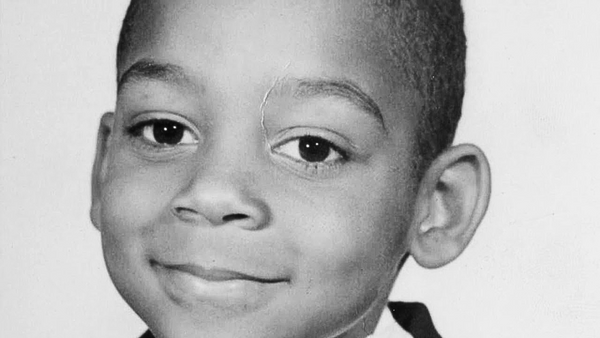
Many musician friends visited his father’s house, so Wynton naturally developed interest in them and their activities. Their interaction was not limited only to talking on music related themes. Wynton also heard how his father and his friends discussed the Civil Rights Act, Bobby Kennedy, Martin Luther King Jr and other active people of that time. Back then, Wynton started to realize the connection between music and people’s experience, which they bring into it.
Wynton received his first trumpet as a gift from his father’s friend at the age of six. When he was eight, he played in historic Fairview Baptist Church Band, where he was introduced to New Orleans’s jazz and brass band traditions.
Wynton was deeply influenced by Maurice André’s music, especially his performance of Joseph Haydn’s Trumpet Concerto in E-flat major, which affected his decision to play classical music. He was also deeply interested in the music of renowned composers such as Bach, Beethoven, Mozart and others.
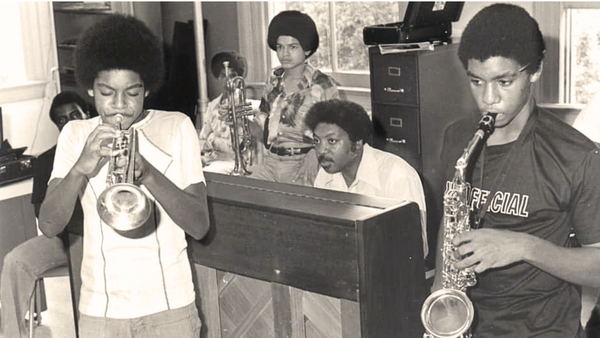
At the age of 14, Marsalis played with the New Orleans Philharmonic orchestra that opened up more opportunities for him. Later he shared the local stages with the New Orleans Symphony Brass Quintet, the New Orleans Community Concert Band, the New Orleans Youth Orchestra, as well as local jazz, funk and brass bands.
His debut recording in the classical genre, featuring Haydn, Hummel, L. Mozart: Trumpet Concertos, was released when he was 20 years old. Wynton got many positive reviews and even won the Grammy Award as the best classical soloist with an orchestra.
Wynton Marsalis and New York
Wynton arrived in New York after graduating from Benjamin D. Franklin High School in New Orleans. There he continued his classical studies at The Juilliard School, as well as started to explore New York’s jazz scene. Soon, he already performed jazz concerts around the city, causing people to wonder who that young musician was.
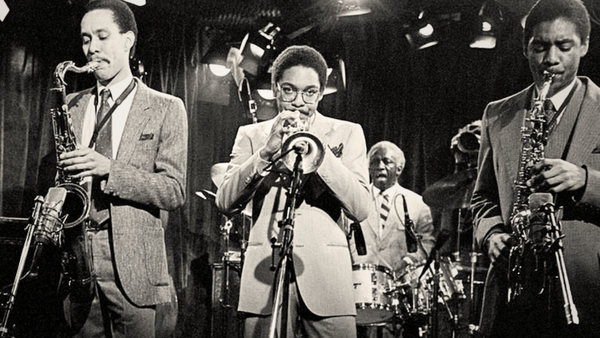
Together with his brother Branford, Wynton joined Art Blakey and the Jazz Messengers’ tour. From Blakey Marsalis developed his distinctive approach to leading a band. Blakey became his mentor, who taught him how important it is to bring soul to every concert. In 1982, Marsalis with his brother Branford put together his own quintet and started touring. He played more than 858 concerts in various cities and 65 gigs around the world.
For Marsalis, New York City became a hub for creative exploration and artistic growth. Together with other talented musicians and mentors, he pushed the boundaries of jazz and successfully blended traditional styles with modern influences.
Wynton Marsalis’ Collaborations and Philosophy
Marsalis collaborated with many talented musicians, including Dizzy Gillespie, Clark Terry, Herbie Hancock, John Lewis, Sarah Vaughan, Tony Williams and other renowned figures in the jazz world. These interactions with legends influenced Wynton and inspired him to create his own unique music.
Marsalis works in various genres, as well as writes a jazz-influenced chamber and symphonic music for classical ensembles in the United States and beyond them. Wynton performs in prestigious concert halls and shares his knowledge with young musicians.
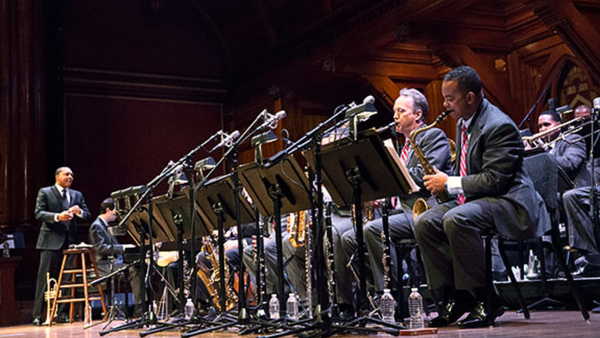
As earlier, Wynton continues to follow his main principles – freedom, individual creativity, collective action and good manners. He keeps on experimenting with improvisations, swing and blues motives. Marsalis believes that music can affect the quality of people’s life and help them reach various levels of consciousness.
Wynton Marsalis as a Teacher and Composer
With many performances, workshops, educational programs and books, Marsalis contributed a lot to growing international interest in jazz music. As in the early 1980s, Wynton holds the place as one of the most influential personalities within the genre.
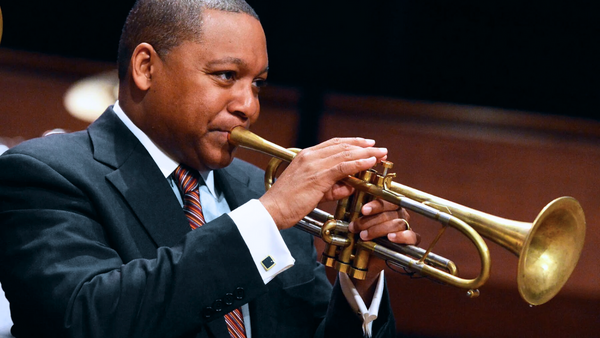
He attracts and inspires new generations of musicians, sparks their interest and teaches them jazz fundamentals. He also continues to capture attention of the audience with virtuosic trumpet playing and innovative compositions. His music features virtuosic skills, technical precision, and expressive style.
As a composer, Wynton has created numerous jazz compositions, led small groups and big bands, where he demonstrated his great skills for arranging and bandleading. He has composed ballet and modern dance scores, chamber pieces, string quartets, symphonies suites, jazz oratorio, as well as concertos for trumpet, tuba and violin.
Wynton Marsalis’ Awards
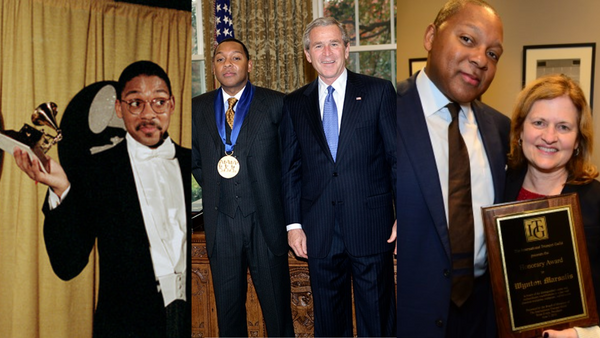
In 1997, Marsalis won the Pulitzer Prize for Music for his jazz opera "Blood on the Fields”, devoted to the tragic theme of slavery in America. He is also an owner of numerous Grammy Awards for Best Jazz Instrumental Album, Best Classical Album, and Best Spoken Word Album. In 2011, Wynton Marsalis received the NEA Jazz Masters Award for great contributions to the advancement of jazz music. It was the highest recognition for jazz musicians in the United States.
Final Word
Without the exaggeration, Marsalis is a cultural ambassador for jazz, who actively promotes the genre worldwide through his performances, recordings, and collaborations. Wynton Marsalis is also a multifaceted personality, great trumpet player, talented composer, wise bandleader and active educator. For his devotion to music, he deserved a recognition within the jazz community and beyond it.
Check out our articles about other musicians, including Louis Armstrong, Miles Davis, Lee Morgan, Arturo Sandoval, Booker Little.




 https://kgumusic.com/pages/about-us
https://kgumusic.com/pages/about-us
1 comment
I missed my vocation to be a classical trumpet player. I like the way Winton Marsalis manages his instrument. I wish I could have a few lessons from him from the first page of Arban… What’s your answer? Master